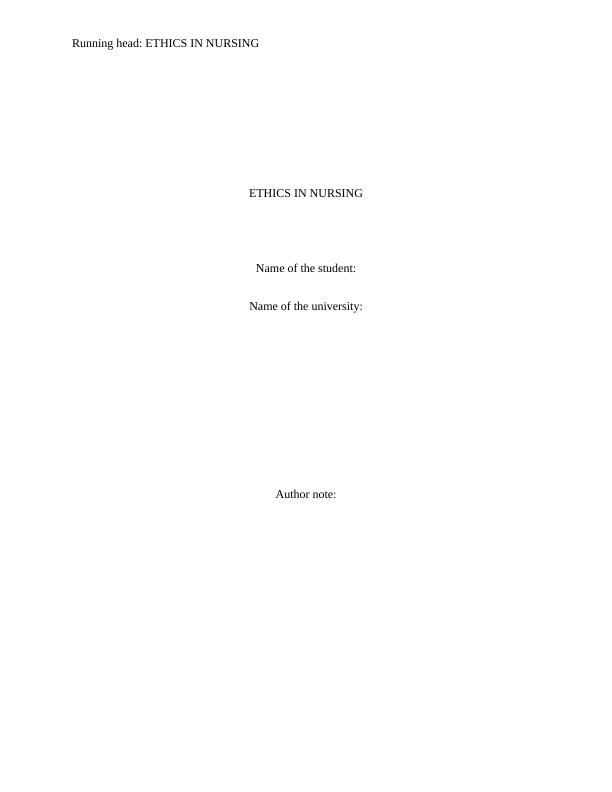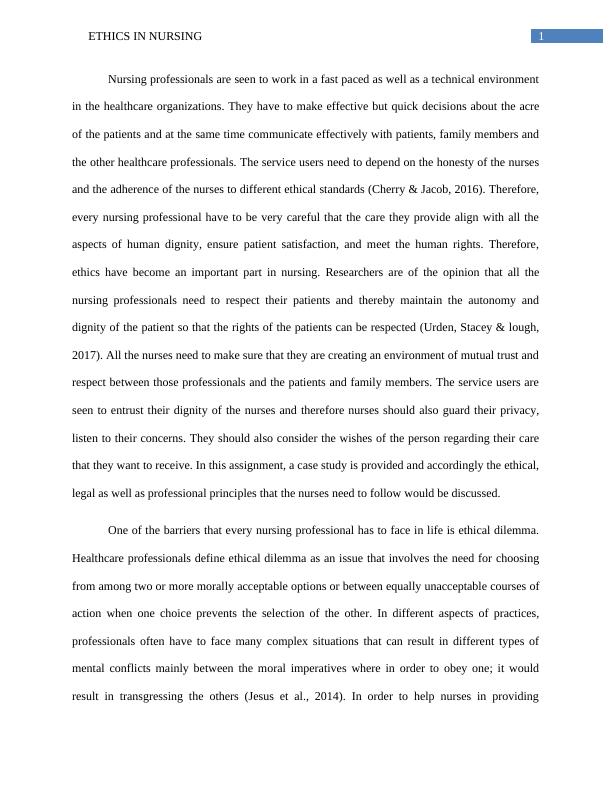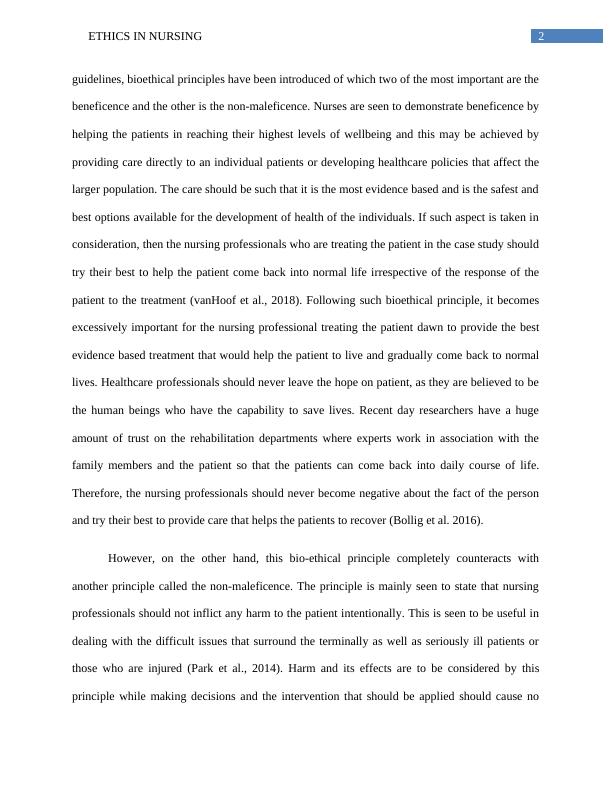Ethics in Nursing: Legal and Professional Responsibilities
Added on 2023-06-10
10 Pages3151 Words303 Views
Running head: ETHICS IN NURSING
ETHICS IN NURSING
Name of the student:
Name of the university:
Author note:
ETHICS IN NURSING
Name of the student:
Name of the university:
Author note:

1ETHICS IN NURSING
Nursing professionals are seen to work in a fast paced as well as a technical environment
in the healthcare organizations. They have to make effective but quick decisions about the acre
of the patients and at the same time communicate effectively with patients, family members and
the other healthcare professionals. The service users need to depend on the honesty of the nurses
and the adherence of the nurses to different ethical standards (Cherry & Jacob, 2016). Therefore,
every nursing professional have to be very careful that the care they provide align with all the
aspects of human dignity, ensure patient satisfaction, and meet the human rights. Therefore,
ethics have become an important part in nursing. Researchers are of the opinion that all the
nursing professionals need to respect their patients and thereby maintain the autonomy and
dignity of the patient so that the rights of the patients can be respected (Urden, Stacey & lough,
2017). All the nurses need to make sure that they are creating an environment of mutual trust and
respect between those professionals and the patients and family members. The service users are
seen to entrust their dignity of the nurses and therefore nurses should also guard their privacy,
listen to their concerns. They should also consider the wishes of the person regarding their care
that they want to receive. In this assignment, a case study is provided and accordingly the ethical,
legal as well as professional principles that the nurses need to follow would be discussed.
One of the barriers that every nursing professional has to face in life is ethical dilemma.
Healthcare professionals define ethical dilemma as an issue that involves the need for choosing
from among two or more morally acceptable options or between equally unacceptable courses of
action when one choice prevents the selection of the other. In different aspects of practices,
professionals often have to face many complex situations that can result in different types of
mental conflicts mainly between the moral imperatives where in order to obey one; it would
result in transgressing the others (Jesus et al., 2014). In order to help nurses in providing
Nursing professionals are seen to work in a fast paced as well as a technical environment
in the healthcare organizations. They have to make effective but quick decisions about the acre
of the patients and at the same time communicate effectively with patients, family members and
the other healthcare professionals. The service users need to depend on the honesty of the nurses
and the adherence of the nurses to different ethical standards (Cherry & Jacob, 2016). Therefore,
every nursing professional have to be very careful that the care they provide align with all the
aspects of human dignity, ensure patient satisfaction, and meet the human rights. Therefore,
ethics have become an important part in nursing. Researchers are of the opinion that all the
nursing professionals need to respect their patients and thereby maintain the autonomy and
dignity of the patient so that the rights of the patients can be respected (Urden, Stacey & lough,
2017). All the nurses need to make sure that they are creating an environment of mutual trust and
respect between those professionals and the patients and family members. The service users are
seen to entrust their dignity of the nurses and therefore nurses should also guard their privacy,
listen to their concerns. They should also consider the wishes of the person regarding their care
that they want to receive. In this assignment, a case study is provided and accordingly the ethical,
legal as well as professional principles that the nurses need to follow would be discussed.
One of the barriers that every nursing professional has to face in life is ethical dilemma.
Healthcare professionals define ethical dilemma as an issue that involves the need for choosing
from among two or more morally acceptable options or between equally unacceptable courses of
action when one choice prevents the selection of the other. In different aspects of practices,
professionals often have to face many complex situations that can result in different types of
mental conflicts mainly between the moral imperatives where in order to obey one; it would
result in transgressing the others (Jesus et al., 2014). In order to help nurses in providing

2ETHICS IN NURSING
guidelines, bioethical principles have been introduced of which two of the most important are the
beneficence and the other is the non-maleficence. Nurses are seen to demonstrate beneficence by
helping the patients in reaching their highest levels of wellbeing and this may be achieved by
providing care directly to an individual patients or developing healthcare policies that affect the
larger population. The care should be such that it is the most evidence based and is the safest and
best options available for the development of health of the individuals. If such aspect is taken in
consideration, then the nursing professionals who are treating the patient in the case study should
try their best to help the patient come back into normal life irrespective of the response of the
patient to the treatment (vanHoof et al., 2018). Following such bioethical principle, it becomes
excessively important for the nursing professional treating the patient dawn to provide the best
evidence based treatment that would help the patient to live and gradually come back to normal
lives. Healthcare professionals should never leave the hope on patient, as they are believed to be
the human beings who have the capability to save lives. Recent day researchers have a huge
amount of trust on the rehabilitation departments where experts work in association with the
family members and the patient so that the patients can come back into daily course of life.
Therefore, the nursing professionals should never become negative about the fact of the person
and try their best to provide care that helps the patients to recover (Bollig et al. 2016).
However, on the other hand, this bio-ethical principle completely counteracts with
another principle called the non-maleficence. The principle is mainly seen to state that nursing
professionals should not inflict any harm to the patient intentionally. This is seen to be useful in
dealing with the difficult issues that surround the terminally as well as seriously ill patients or
those who are injured (Park et al., 2014). Harm and its effects are to be considered by this
principle while making decisions and the intervention that should be applied should cause no
guidelines, bioethical principles have been introduced of which two of the most important are the
beneficence and the other is the non-maleficence. Nurses are seen to demonstrate beneficence by
helping the patients in reaching their highest levels of wellbeing and this may be achieved by
providing care directly to an individual patients or developing healthcare policies that affect the
larger population. The care should be such that it is the most evidence based and is the safest and
best options available for the development of health of the individuals. If such aspect is taken in
consideration, then the nursing professionals who are treating the patient in the case study should
try their best to help the patient come back into normal life irrespective of the response of the
patient to the treatment (vanHoof et al., 2018). Following such bioethical principle, it becomes
excessively important for the nursing professional treating the patient dawn to provide the best
evidence based treatment that would help the patient to live and gradually come back to normal
lives. Healthcare professionals should never leave the hope on patient, as they are believed to be
the human beings who have the capability to save lives. Recent day researchers have a huge
amount of trust on the rehabilitation departments where experts work in association with the
family members and the patient so that the patients can come back into daily course of life.
Therefore, the nursing professionals should never become negative about the fact of the person
and try their best to provide care that helps the patients to recover (Bollig et al. 2016).
However, on the other hand, this bio-ethical principle completely counteracts with
another principle called the non-maleficence. The principle is mainly seen to state that nursing
professionals should not inflict any harm to the patient intentionally. This is seen to be useful in
dealing with the difficult issues that surround the terminally as well as seriously ill patients or
those who are injured (Park et al., 2014). Harm and its effects are to be considered by this
principle while making decisions and the intervention that should be applied should cause no

End of preview
Want to access all the pages? Upload your documents or become a member.
Related Documents
An Ethical Dilemmalg...
|6
|2031
|341
Nursing Assignment | Nursing Principles Assignmentlg...
|5
|1106
|32
How Can We Conduct an Ethical Analysis (Docs Download Free)lg...
|5
|887
|18
Ethical Dilemma in Nursing: Balancing Autonomy and Paternalismlg...
|10
|2593
|237
Social and Moral Context of Healthcarelg...
|5
|1476
|127
Social and Moral Context of Healthcarelg...
|5
|1476
|152
